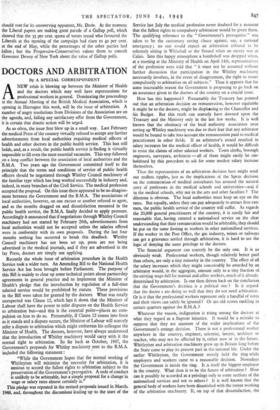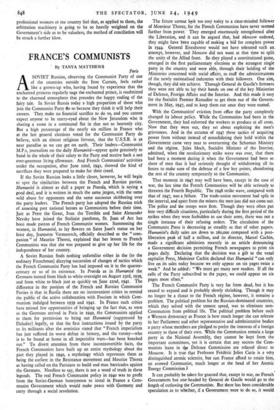DOCTORS AND ARBITRATION
By A SPECIAL CORRESPONDENT
ANEW crisis is blowing up between the Minister of Health and the doctors which may well have repercussions for professional workers in general. Dominating the proceedings at the Annual Meeting of the British Medical Association, which is opening in Harrogate this week, will be the issue of arbitration. A number of angry resolutions from Divisions of the Association are on the agenda, and, failing any satisfactory offer from the Government, it is certain that drastic action will be urged.
As so often, the issue first blew up in a small way. Last February the medical Press of the country virtually refused to accept any further advertisements from local authorities requiring medical officers of health and other doctors in the public health service. This ban still holds, and, as a result, the public health service is finding it virtually impossible to fill even the most essential vacancies. This step followed on a long conflict between the association of local authorities and the -B.M.A. Two years ago the Government committed itself to the principle that the terms and conditions of service of public health officers should be negotiated through Whitley Council machinery of the familiar type which has long worked successfully in industry and, indeed, in many branches of the Civil Service. The medical profession accepted the proposal. On this issue there appeared to be no disagree- ment between the Government and the B.M.A. The associations of local authorities, however, on one excuse or another refused to agree, and as the months dragged on and dissatisfaction mounted in the public health service, the B.M.A. finally decided to apply pressure. Accordingly it announced that if negotiations through Whitley Council machinery had not started by February 28th, advertisements from local authorities would not be accepted unless the salaries offered were in conformity with its own proposals. During the last four months nothing has occurred to break this deadlock. Whitley Council machinery has not been set up, posts are not being advertised in the medical journals, and if they are advertised in the lay Press, doctors are simply not applying.
Recently the whole issue of arbitration procedure in the Health Service took a wider turn. An Amending Bill to the National Health Service Act has been brought before Parliament. The purpose of this Bill is mainly to clear up some technical points about partners-lip agreements in general practice and to implement the Minister of Health's pledge that the introduction by regulation of a full-time salaried service would be prohibited by statute. These provisions in the Bill were taken for granted by the doctors. What was totally unexpected was Clause 12, which lays it down that the Minister of Labour shall have the power to refer disputes on the Health Service to arbitration but—and this is the essential point—places no com- pulsion on him to do so. Presumably, if Clause 12 Comes into force as it stands and a dispute occurs, the Minister of Labour will scarcely refer a dispute to arbitration which might embarrass his colleague the Minister of Health. The doctors, however, have always understood that the introduction of Whitley machinery would carry with it the normal right to arbitration. So far back as October, 1947, the Government's proposals for Whitley machinery ,sent to the B.M.A. included the following statement :
"While the Government hopes that the normal working of Whitleyism will minimise the necessity for arbitration, it is anxious to accord the fullest rights to arbitration subject to the . preservatiOn of the Government's prerogative. A code of conduct is unlikely to be arbitrable, but a simple proposal for a change' in wage or salary rates almost certainly is." ..
This pledge was repeated in the revised proposals issued in March, 1948, and, throughout the discussions leading up to the start of the
Service last July the medical profession never doubted for a moment that the fullest rights to compulsory arbitration would be given them. The qualifying reference to the " Government's prerogative " was taken to be the customary saving clause against, say, a national emergency ; no one would expect an arbitration tribunal to be solemnly sitting in Whitehall or the Strand when an enemy was at Calais. Into this happy atmosphere a bombshell was dropped when, at a meeting at the Ministry of Health on April 14th, representatives of the profession were told that " it must not be assumed without further discussion that participation in the Whitley machinery necessarily involves, in the event of disagreement, the right to resort compulsorily to arbitration on all subjects." Thus it appears that for some inscrutable reason the Government is proposing to go back on an assurance given to the doctors of the country on a crucial issue.
How has this happened ? Presumably the Treasury has pointed out that an arbitration decision on remuneration, however equitable it might be to the doctors, might be displeasing to the Chancellor and his Budget. But this truth can scarcely have dawned upon the Treasury and the Ministry only in the last few weeks. It is well known that the obstinacy of the local authority association over. setting up Whitley machinery was due to their fear that any arbitrator would be bound to take into account the remuneration paid to medical practitioners in other fields. If an arbitrator's award resulted in salary increases for the medical officer of health, it would be difficult to resist the claims of other salaried workers. Town clerics, borough engineers, surveyors, architects — all of them might easily be em- boldened by this precedent to ask for some modest salary increase themselves.
Thus the repercussions of an arbitration decision here might send out endless ripples, just as the implications of the Spens decision on the remuneration of medical consultants has aroused the natural envy of professors in the medical schools and universities—and if. in the medical schools, why not in the arts and other faculties ? The dilemma is obvious. The local authorities must keep an eye on the rates. But equally, unless they can pay adequately to attract first-rate men, the public health service of the country will suffer. As regards the 20,000 general practitioners of the country, it is surely fair and reasonable that, having entered a nationalised service on the dear understanding that their remuneration would be arbitrable, they should be put on the same footing as workers in other nationalised services. If the worker in the Post Office, the gas industry, mines or railways can get a grievance settled through arbitration, it is hard to see the logic of denying the same privilege to the doctors.
The financial argument can scarcely be the only one. It is so obviously weak. Professional workers, though relatively better paid than others, are only a tiny minority in the country. The effect of all the salary increases which they might conceivably be awarded by an arbitrator would, in the aggregate, amount only to a tiny fraction of the existing wage-bill for manual and other workers, much of it already determined by arbitration. Is one then driven back on the conclusion. that the Government's decision is a political one ? Is it argued that the doctor s are doing so well that they do. not need arbitration. Or is it that the professional workers represent only a handful of votes and their views can safely be ignored ? Or are old scores rankling in certain quarters against the B.M.A. ?
Whatever the reason, indignation is rising among the doctors at what they regard as a .flagrant injustice. It would be a mistake to suppose that they are unaware of the wider implications of the Government's strange decision. There is not a professional worker anywhere in the country, engineer, scientist, lawyer, architect or teacher, who may not be affected by it, either now or in the future. Whitleyism and arbitration machinery grew up in Britain long before the State came to play its present part in the national life. Under the earlier Whitleyism, the Government merely held the ring while employers and workers came to a reasonable decision. Nowadays the Government is inside the ring. It is itself the biggest employer in the country. What then is to be the future of arbitration ? How can it possibly be accorded as a 'privilege only to some sections of the nationalised services and not to others ? It is well known that the general body of workers have been dissatisfied with the recent working of the arbitration machinery. If, on top of that dissatisfaction, the
professional workers of •the country feel that, as applied to them, the arbitration machinery is going to be so heavily weighted on the Government's side as to be valueless, the method of conciliation will be struck a further blow.



































 Previous page
Previous page